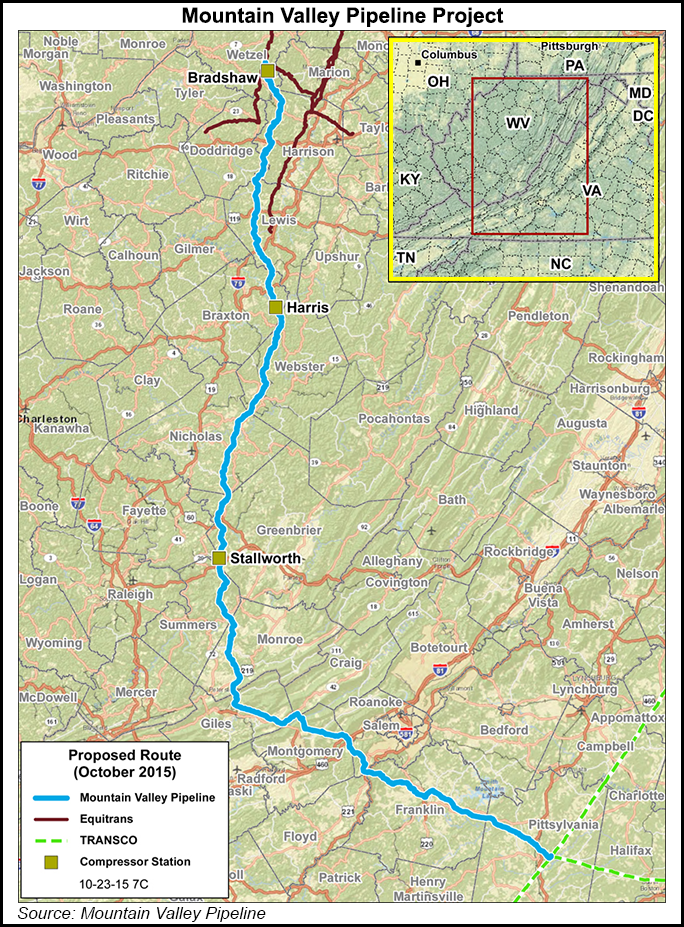Regulatory | Infrastructure | NGI All News Access | NGI The Weekly Gas Market Report
MVP Costs Again Increase on Regulatory Delays
EQM Midstream Partners LP (EQM) on Tuesday again said the Mountain Valley Pipeline (MVP) would cost more to construct and take longer to enter service as legal issues continue to cause delays.

Project sponsors are targeting a new in-service date of late 2020 and the pipeline is now expected to cost up to $5.5 billion. Tuesday’s announcement was the latest in a series of cost overruns and delays. Sponsors were previously aiming to start operations on the 2 Bcf/d Appalachian pipeline in mid-2020 at a cost of up to $5 billion.
When construction started last year, the pipeline was estimated to cost $3.5 billion and be in service by 4Q2018.
“We have encountered unforeseen development challenges,” said EQM COO Diana Charletta. “However, we continue to make progress toward ultimate completion. While the temporary setbacks have caused schedule delays and cost overages, completion of the MVP project is critical to serving the growing demand for domestic natural gas in the Mid-Atlantic and Southeast regions of the United States.”
MVP has been plagued by legal challenges, permit issues, work stoppages and fines since construction started early last year. Last week, the Federal Energy Regulatory Commission ordered the project to stop nearly all construction along the entire 303-mile route in response to a federal court’s decision to stay the pipeline’s Biological Opinion (BO) and Incidental Take Statement (ITS).
MVP had voluntarily suspended some construction activities in August after environmental groups filed a challenge against the federal authorizations. Without the BO and ITS, the project can’t move forward, but the U.S. Fish and Wildlife Service is expected to revise and reissue them by January.
The voluntary suspension has prevented MVP from working in streams and wetlands where endangered species are at risk, stopping what construction remains and forcing the project to shift more mainline work into next year.
“This resequencing of work has created carrying costs and caused the use of additional time and crews needed to safely maintain the entire 303-mile route over the winter, as opposed to focusing on maintaining only unrestored sections of the route had construction been fully completed as planned during 2019,” EQM said.
EQM said Tuesday 90% of the project is complete. Three compressor stations and three interconnects are finished, while 80% of the pipeline work is done, which includes 264 miles of pipe welded in place, and 50% of the right-of-way (ROW) has been restored.
Other legal and regulatory issues remain. MVP sponsors are monitoring an appeal that the U.S. Supreme Court has agreed to hear. The similarly routed Atlantic Coast Pipeline appealed the U.S. Court of Appeals for the Fourth Circuit’s decision that found the U.S. Forest Service lacked authority to grant ROW for oil and gas pipelines to cross the Appalachian Trail. The outcome of that case could ultimately impact MVP.
MVP is a joint venture between EQM, NextEra Capital Holdings Inc., Con Edison Transmission Inc., WGL Midstream Inc. and RGC Midstream LLC. The project would move Appalachian gas from West Virginia to Virginia and connect with the Transcontinental Gas Pipe Line to tap markets in the Southeast. EQM would operate the system.
© 2024 Natural Gas Intelligence. All rights reserved.
ISSN © 1532-1231 | ISSN © 2577-9877 | ISSN © 1532-1266 |
